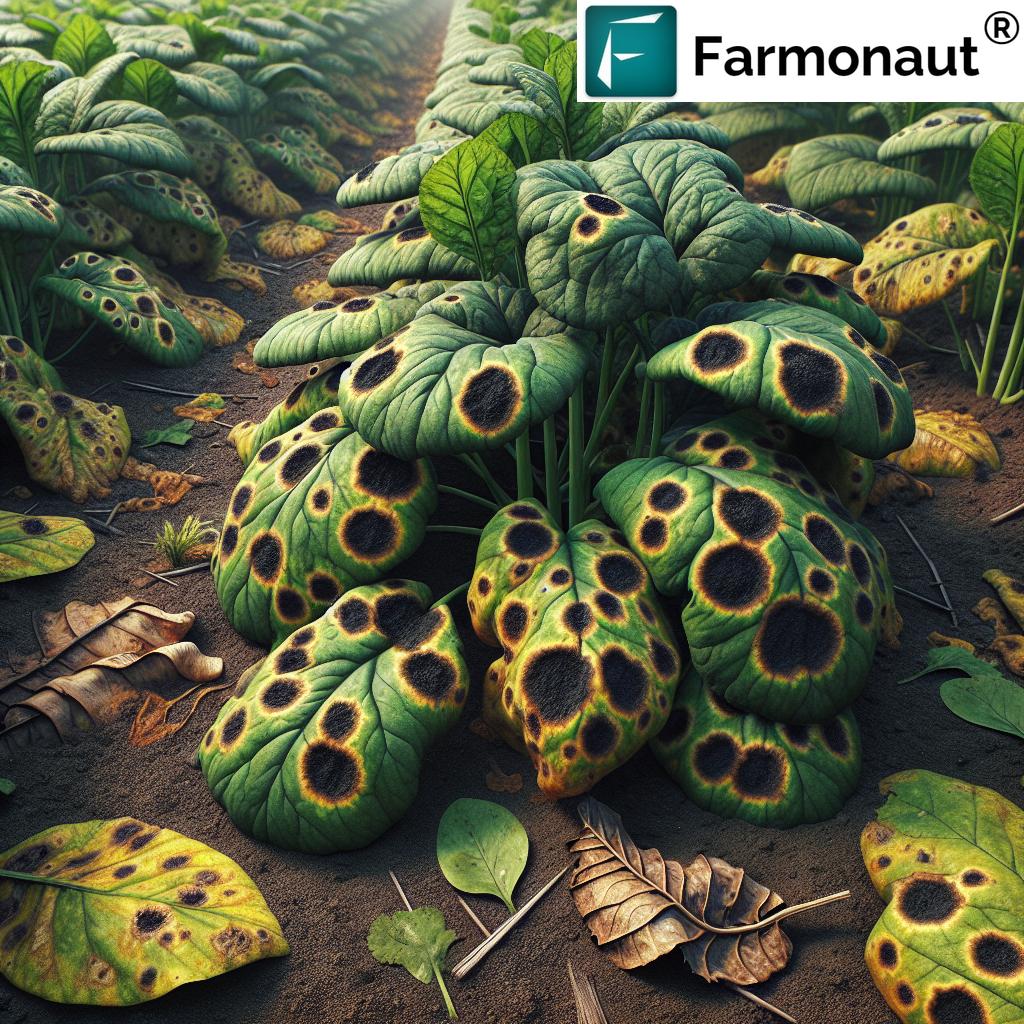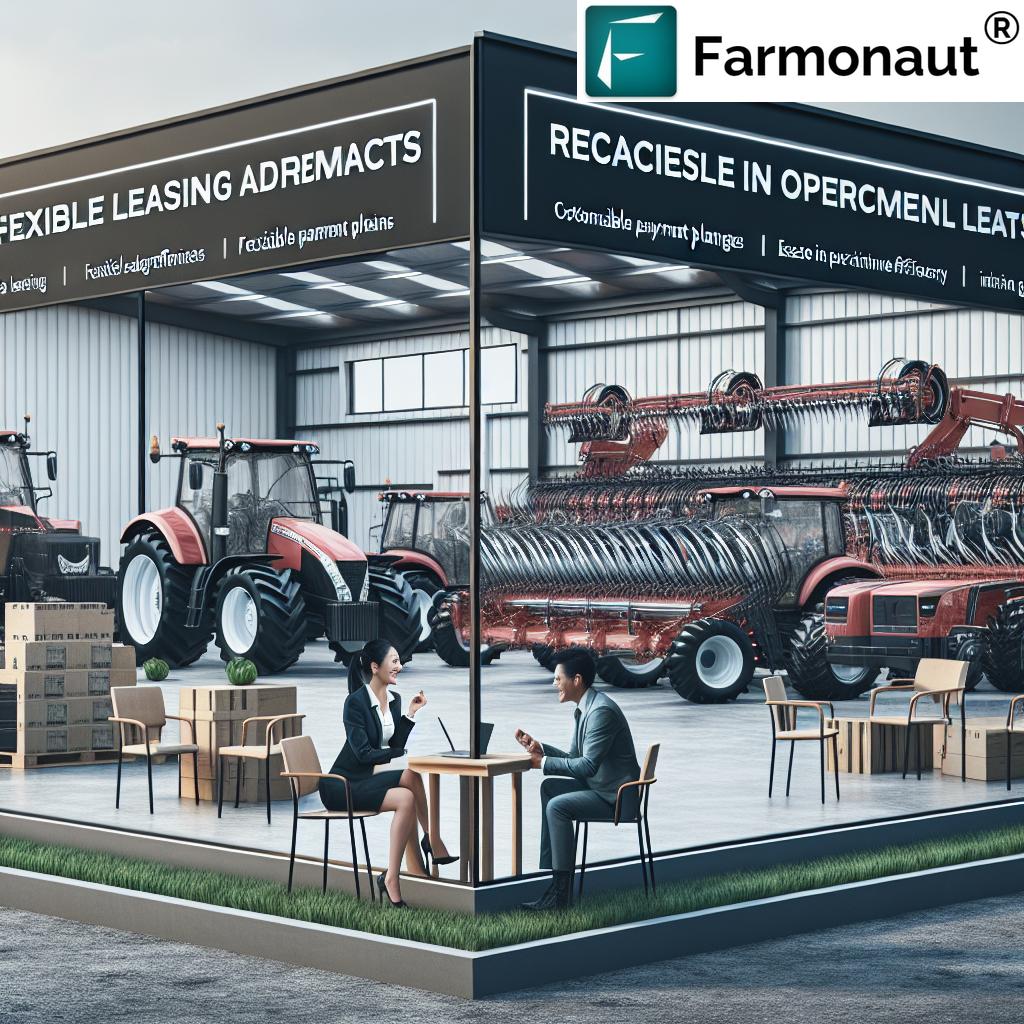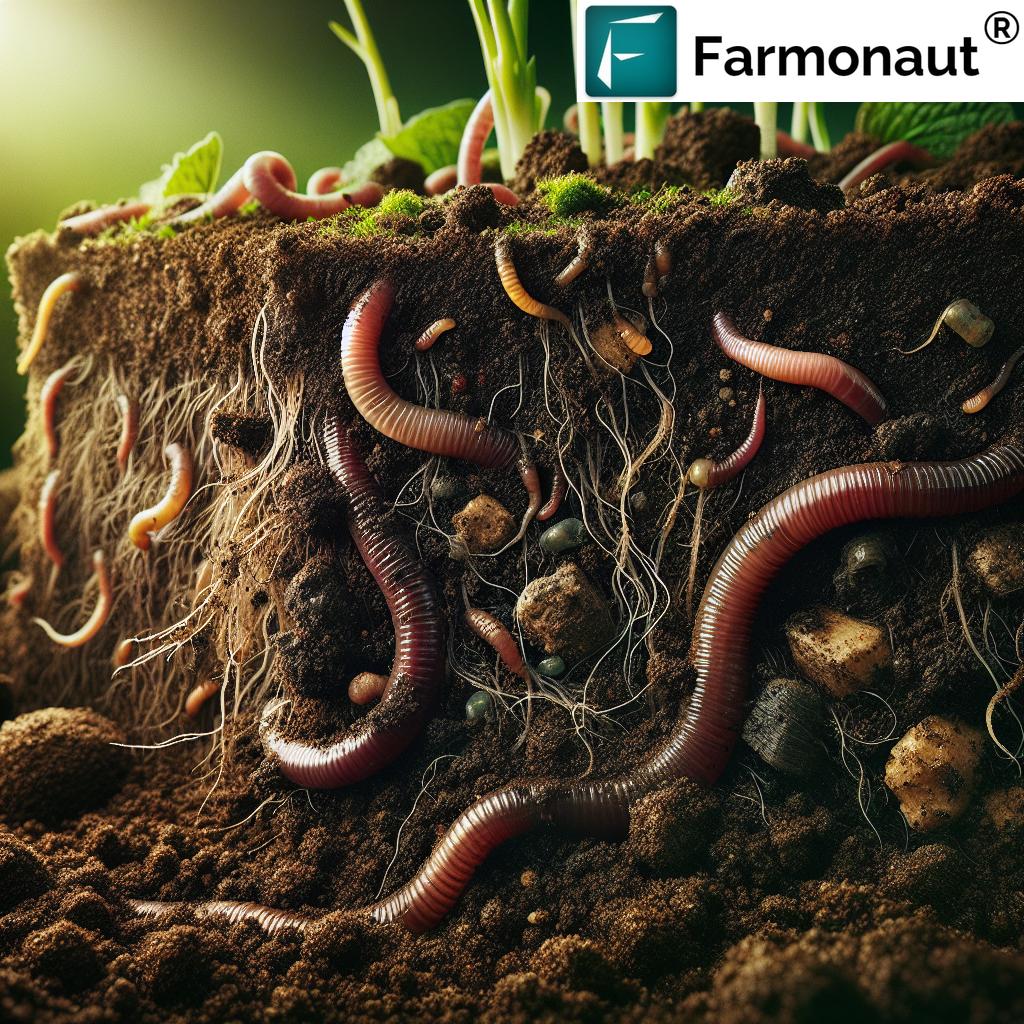Mini Cow Breeders & Farms 2026: Discover Top Fluffy Breeds for Sustainable Agriculture
“The smallest mini cow breed stands under 36 inches tall, making them ideal for small sustainable farms.”
Table of Contents
- The Rise of Mini Cow Breeders and Farms: 2026 Outlook
- Understanding Mini Cows: Characteristics and Appeal
- Exploring the Smallest Mini Cow Breed & Fluffy Varieties
- Mini Cow Breed Comparison Table
- Mini Cow Farming Benefits for Sustainable Agriculture
- Health, Temperament & Breeding Standards
- Cow Feeders for Sale: Specialized Equipment for Mini Breeds (2025 & Beyond)
- Locating Mini Cow Farms and Breeders Near You
- How Farmonaut Empowers Mini Cow Farming Sustainability
- Frequently Asked Questions (FAQs) on Mini Cow Breeds
- Conclusion: The Future of Mini Cow Farms
The Rise of Mini Cow Breeders and Farms: 2026 Outlook
In recent years, the demand for mini cow breeders has surged among farmers, hobbyists, and agricultural entrepreneurs. This surge signifies a move towards sustainable, manageable, and efficient farming practices. As we progress into 2026, mini cows are carving a unique niche within the livestock sector. The agricultural landscape is witnessing a transformation as compact, miniature bovines become increasingly popular. This article explores the current state and future of mini cow breeders and farms, highlighting why these animals are both accessible and appealing.
Traditionally, cattle farming has required significant land, resources, and infrastructure. Mini cow farms, often located closer to urban centers or set within diversified agricultural models, provide an accessible option for individuals constrained by land or resources. This makes the search term “mini cow farm near me” an ever more common query in 2025 and 2026, reflecting the shift in farming practices.
“By 2026, over 40 mini cow farms are expected to pioneer sustainable dairy solutions in the US alone.”
Why Are Mini Cows So Popular?
- Versatility: Whether for milk, meat, or companion purposes, mini cows excel in various roles.
- Efficiency: They require less feed and land compared to traditional livestock, making them cost-effective.
- Manageable Size: Their small stature is ideal for urban, peri-urban, and small acreage farms.
- Accessible Breeding: Mini cow breeders play a pivotal role by offering healthy, temperament-checked breeds tailored for specific farming goals.
As 2026 approaches, the rise of mini cow breeders marks a shift in how we perceive cattle farming. This shift emphasizes biodiversity, sustainability, and environmental consciousness—key pillars for the future of agriculture.
Understanding Mini Cows: Characteristics and Appeal
Mini cows are broadly defined as cattle breeds that are smaller than their traditional counterparts. Generally, an adult mini cow stands between 36 and 42 inches at the shoulder and weighs between 400 and 700 pounds. These miniatures are a result of both selective breeding and the natural genetic diversity found among certain cattle breeds.
What Sets Mini Cows Apart?
- Space-Efficient: Mini cows require less significant acreage, making them ideal for small farms and urban zones.
- Feed Savings: Their smaller size leads to lower annual feed costs, with many mini cow breeds consuming only a fraction compared to larger breeds.
- Milder Temperament: Selective breeding often emphasizes gentle nature and ease of handling, attracting families and new farmers alike.
- Diverse Purposes: Many mini cows are raised for meat, dairy, or simply as companion animals.
The mini fluffy cow breed, along with the more traditional Miniature Zebu and Dexter breeds, are highlighted for their adaptability and diminutive stature. The increasing popularity of these fluffy mini varieties reflects a broader trend where livestock selection aligns with both aesthetic appeal and practical sustainable farming benefits.
Farmonaut: Real-Time Agriculture Monitoring for Mini Cow Farms
Our satellite-driven platform empowers mini cow breeders and farmers by offering large-scale farm management via Android, iOS, web, and API. From environmental impact tracking to crop and pasture health analytics, Farmonaut helps modern farms boost sustainability & resource use. Try out our web app for streamlined farm monitoring.
Exploring the Smallest Mini Cow Breed & Fluffy Varieties
When evaluating mini cow breeders and breeds for 2025 and beyond, certain standout varieties repeatedly come up:
Miniature Zebu: The Smallest Mini Cow Breed
- Height: As low as 34–36 inches at the shoulder
- Weight: Usually between 300–500 pounds
- Traits: Drought-resistant, hardy; their adaptable nature makes them highly sustainable for small acreage farms.
The Miniature Zebu is widely recognized as the smallest mini cow breed. Its diminutive stature and docile disposition enable it to thrive in areas with limited land and resources—perfect for sustainable agriculture models.
Dexter Mini Cow: Compact and Efficient
- Height: 36–42 inches
- Weight: 400–700 pounds
- Traits: Dual-purpose (meat and dairy), hardy, and economical to feed.
Mini Fluffy Cow Breed: Cuteness Meets Practicality
- Height: 36–42 inches
- Weight: 400–600 pounds
- Traits: Noted for their fluffy coats, gentle temperament, and incredible appeal for families and hobby farms.
The mini fluffy cow breed is becoming particularly popular because of both appearance and ease of management, making them a cornerstone breed for mini cow farms near me searches in 2026.
Mini Angus Cow: Premium Beef on a Smaller Scale
- Height: 38–42 inches
- Weight: 600–800 pounds
- Traits: High-quality beef, efficient feed conversion, and strong adaptability.
The mini Angus cow offers the meat quality of traditional Angus but in a smaller, more manageable frame—an economically efficient option for niche beef markets.
Other Notable Mini Breeds
- Mini Jersey Cow: Famous for rich milk production in a tiny package.
- Lowline Angus: A naturally small, efficient beef breed perfect for sustainable farms.
Mini Cow Breed Comparison Table
| Breed Name | Average Adult Height (inches) | Average Adult Weight (lbs) | Notable Physical Traits | Estimated Annual Feed Cost (USD) | Sustainable Farming Benefits | Ideal Climate |
|---|---|---|---|---|---|---|
| Miniature Zebu | 34–36 | 300–500 | Smallest; short horns; heat-tolerant | $350–$550 | Minimal land and feed requirements; thrives with less input | Warm, arid to humid |
| Mini Fluffy Cow (e.g., Mini Highland) | 36–42 | 400–600 | Fluffy coat; long bangs; gentle temperament | $400–$600 | Low impact grazing, easy handling | Temperate, cool |
| Dexter | 36–42 | 400–700 | Stocky build; dual-purpose (meat/dairy) | $400–$650 | Dual-purpose; hardiness; low space needs | Versatile, temperate to cool |
| Mini Angus Cow | 38–42 | 600–800 | Classic black coat; compact muscular frame | $450–$700 | Efficient beef production on small land | Most climates, adaptable |
| Mini Jersey Cow | 36–40 | 400–600 | Fawn color; rich milk production | $400–$650 | High milk yield in small size | Mild to warm |
| Lowline Angus | 36–42 | 600–700 | Short stature; beefy build | $450–$700 | Efficient for beef in limited space | Temperate, adaptable |
Mini Cow Farming Benefits for Sustainable Agriculture
The move towards sustainable agriculture is reshaping the future of farming. Mini cows play a significant role in this transformation due to their reduced feed requirements, minimal land use, and contribution to livestock biodiversity.
Key Benefits of Mini Cows for Modern Farms
- Low Environmental Impact: Lower resource consumption leads to reduced greenhouse gas emissions and less land degradation.
- Cost Savings: Annual feed costs are significantly lower compared to full-sized cattle. Many breeds thrive on pastures unsuited to larger cows.
- Accessible & Manageable: Their temperaments, size, and care requirements are perfect for newcomers, smallholder farms, and educational agricultural programs.
- Diversification & Biodiversity: Raising multiple mini cow breeds supports genetic diversity, strengthening farm resilience and future-proofing livestock agriculture.
- Niche Markets: The mini cow sector appeals to boutique dairy producers and specialty meat markets, often commanding premium prices due to their uniqueness and sustainable credentials.
The mini fluffy cow breed and compact varieties like the Dexter and Mini Angus Cow are thus more than cute additions—they’re pivotal for the sustainable, efficient, and diversified farms of 2026 and beyond.
Farmers striving to lower their agricultural operations’ carbon footprint should consider Farmonaut’s carbon footprint tracking tools. Our technology helps track and reduce emissions—with straightforward, satellite-based monitoring for sustainable farms.
Health, Temperament & Breeding Standards Among Mini Cow Breeders
Health, temperament, and breed standards are crucial for ensuring mini cows remain viable and productive on a small scale. Over recent years, reputable mini cow breeders have emphasized:
- Biosecurity: Rigorous health checks, vaccinations, and disease resistance have become foundational for breeders.
- Temperament: Gentle, manageable cows are favored among operators, families, and educational farms.
- Breed Standards: Maintaining consistency in size, conformation, and productivity ensures the next generation of mini cows thrive and maintain appeal.
- Sustainable Breeding: Practices aimed at balancing productive traits (meat, milk) with long-term health and adaptability.
This focus helps this niche livestock sector deliver the full range of benefits expected by farmers, hobbyists, and aspiring agricultural entrepreneurs.
Transparency matters in modern farming! Farmonaut’s blockchain-based traceability tools provide end-to-end supply chain transparency for both small and large-scale mini cow farms, ensuring trust in sustainable food products and livestock management.
Cow Feeders for Sale: Specialized Equipment for Mini Breeds (2025 & Beyond)
The evolution of cow feeders is parallel to the rise in mini cow farming. Recognizing the smaller frame and unique dietary needs of miniatures, manufacturers have begun to design specialized, low-profile feeders tailored specifically for these animals.
Features of Modern Cow Feeders for Mini Cows (2025-2026):
- Adjustable Heights: Many feeders can be set low to the ground, ensuring easy access for even the smallest mini cow breed.
- Feed Waste Reduction: Feeders are designed to discourage trampling and spillage, optimizing use and reducing costs.
- Integrated Sensors: 2026 models now feature digital monitoring, alerting farmers to eating patterns, feed quantities, and inventory in real time.
- Durability: Weather-resistant and easy to clean, promoting herd health and minimizing maintenance.
Modern agricultural markets offer a wide range of cow feeders for sale—many optimized for mini cow breeds—providing a direct path to efficient feed management and improved animal welfare.
Did you know? Our satellite-based verification can streamline crop loan and insurance processes for mini cow and mixed agriculture operations. See more at Farmonaut Crop Loan and Insurance Platform.
Locating Mini Cow Farms and Breeders Near You
With the growing interest in mini cows, finding a mini cow farm near me or connecting with reputable mini cow breeders has become easier than ever, particularly as we move into 2026. The digital age has brought online platforms and specialized agricultural networks to the fore—streamlining searches, purchasing, and breed verification.
Tips for Finding Mini Cow Farms & Breeders in 2026
- Leverage agricultural platforms—they frequently list certified mini cow breeders, their available breeds, health details, and pricing.
- Check for proximity: Use “mini cow farm near me” and “[your location]” when searching, as many breeders focus on connecting local farmers and reducing transport costs.
- Verify health and breeding standards with breeder-supplied documentation and references.
- Look at specialized niche forums, regional livestock groups, and farm supply networks for firsthand reviews and recommendations.
Locating the right mini cow breeders ensures efficient acquisition of top breeds and supports local agricultural communities.
Farmers managing fleets of farm vehicles alongside mini cow herds can benefit from our fleet management tools. Optimize routes, monitor usage, and manage costs efficiently—all through real-time satellite analytics.
How Farmonaut Empowers Mini Cow Farming Sustainability
At Farmonaut, we are committed to making satellite-driven insights affordable and accessible for both large and small agricultural enterprises—including those focused on mini cow farms and breeding operations.
Key Ways Our Satellite Solutions Support Mini Cow Breeders:
- Real-Time Monitoring: We provide satellite-based analytics on forage quality, soil health, water use, and pasture productivity—crucial for mini cow farming sustainability.
- AI-Driven Advisory: Our Jeevn AI supports farm management with weather forecasts and crop/pasture advisories, helping optimize minis’ feed and welfare.
- Blockchain Traceability: We offer end-to-end traceability for cattle origin verification, reducing fraud and ensuring supply chain transparency—see more at our product traceability platform.
- Environmental Impact Tracking: Farmonaut enables mini cow farms to monitor their carbon footprint and adapt sustainable practices with our carbon footprinting solutions.
- Financial Accessibility: Our satellite verification protocols help financial institutions offer tailored crop loan and insurance solutions.
Farmonaut’s tools are scalable—supporting everyone from individual farmers to government agencies—and designed to make sustainable, technologically advanced farming not just a goal, but a day-to-day reality for mini cow operations in 2026 and beyond.
Expand your agricultural insights beyond traditional crops: Farmonaut’s crop plantation and forest advisory platform delivers tailored recommendations for pasture, silvopasture, and forage systems, all key for healthy, sustainable mini cow farms.
Frequently Asked Questions (FAQs) on Mini Cow Breeds in 2026
Q1: What is the smallest mini cow breed available in 2026?
The Miniature Zebu is widely regarded as the smallest mini cow breed, typically standing under 36 inches at the shoulder when fully grown. This makes them ideal for micro-farms and sustainable dairy operations.
Q2: How do mini cows differ from standard cattle breeds?
Mini cows are significantly smaller in height and weight, require less feed, land, and management effort, and remain productive for both dairy and meat. Their manageable size and gentler temperament make them favorites among new farmers and families.
Q3: Are mini cows suitable for urban or suburban zones?
Yes. Their low space needs and mild nature make them particularly appealing for peri-urban farms, educational institutions, and small homesteads closer to urban zones.
Q4: Where can I find cow feeders for sale designed for mini breeds?
Many agricultural suppliers and online platforms now offer tailored cow feeders for sale. Look for adjustable, ground-level models with anti-waste features and digital feed monitoring. For resource-efficient management, consider integrating satellite or IoT technology.
Q5: Do mini cows produce enough milk or meat for commercial sale?
While individual yields are smaller, mini breeds like the Mini Jersey or Dexter can provide quality milk and meat suitable for local, premium, or niche markets. Their efficiency and low input requirements support sustainable, small-scale commercial operations.
Q6: Can Farmonaut’s tools be used for managing mini cow farms?
Absolutely. Our solutions provide satellite-enabled farm monitoring, AI-based advisories, traceability, and carbon tracking—all scalable for operations of any size, including mini cow farms.
Conclusion: The Future of Mini Cow Farms
The trend of mini cow farming is set to continue growing in both popularity and importance through 2026 and beyond. Fueled by their versatility, cost-effectiveness, and alignment with sustainable farming values, mini cows—including the smallest mini cow breed, the fluffy mini cow breed, and the mini Angus cow variant—are shaping the future of agriculture. As breeders refine genetics and standards and as technology like Farmonaut’s satellite-driven insights empower smarter management, mini cows are poised to remain at the heart of small and large agricultural operations alike.
With advanced feeders, broad breeder networks, and growing support through digitized agricultural platforms, the mini cow sector is ready to meet the evolving challenges of efficiency, sustainability, and accessible farming well into the future. Whether you are a farmer, hobbyist, or entrepreneur, mini cows offer a pathway toward responsible, rewarding, and resilient agriculture in 2026 and beyond.
Are you a developer or an agritech entrepreneur? You can access Farmonaut’s satellite weather and farm insights API for real-time integration into farm management, feed tracking, and sustainability analytics.
Farmonaut Satellite API for Agriculture
API Developer Documentation













